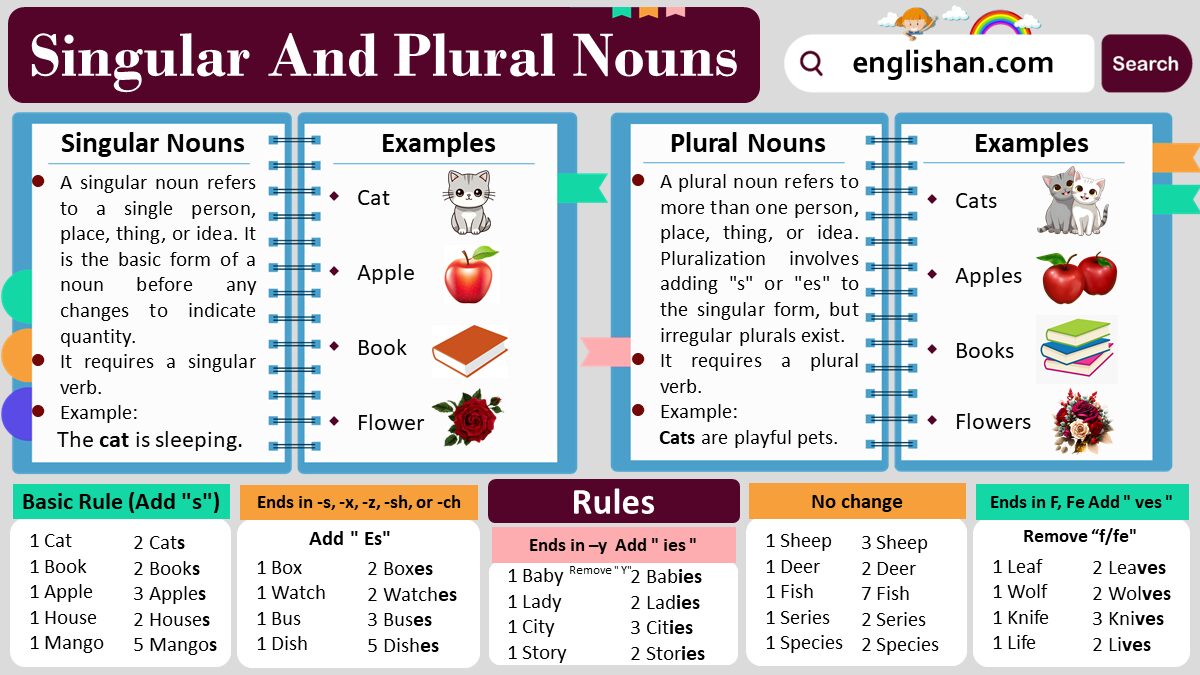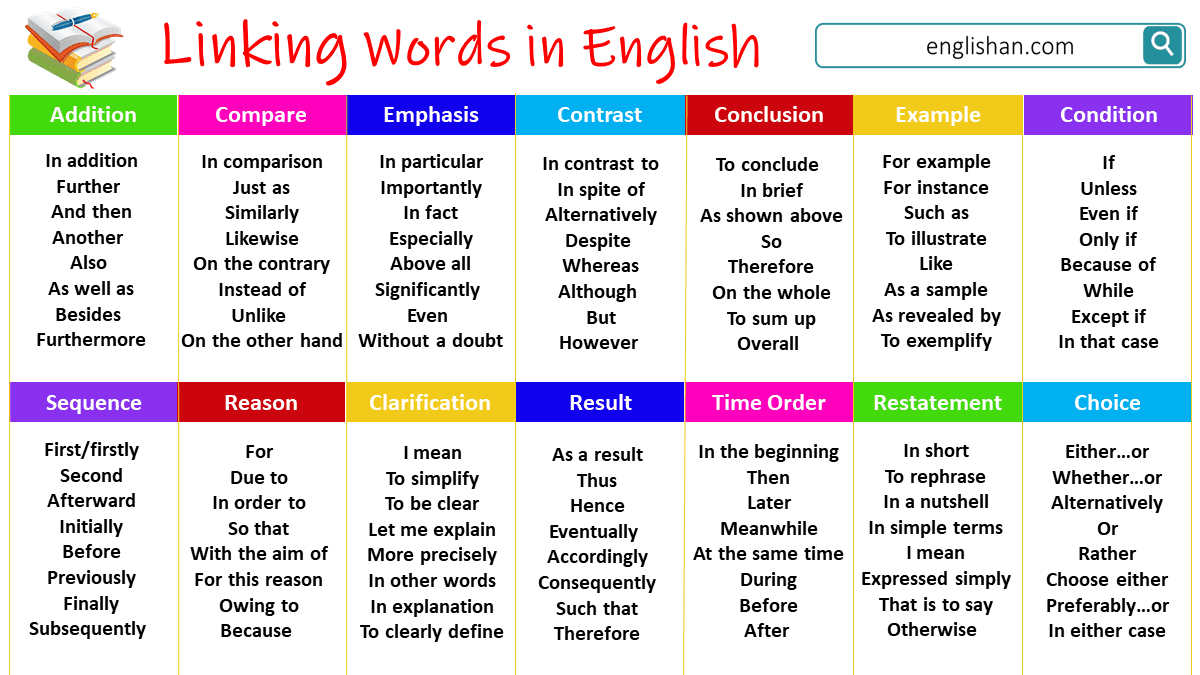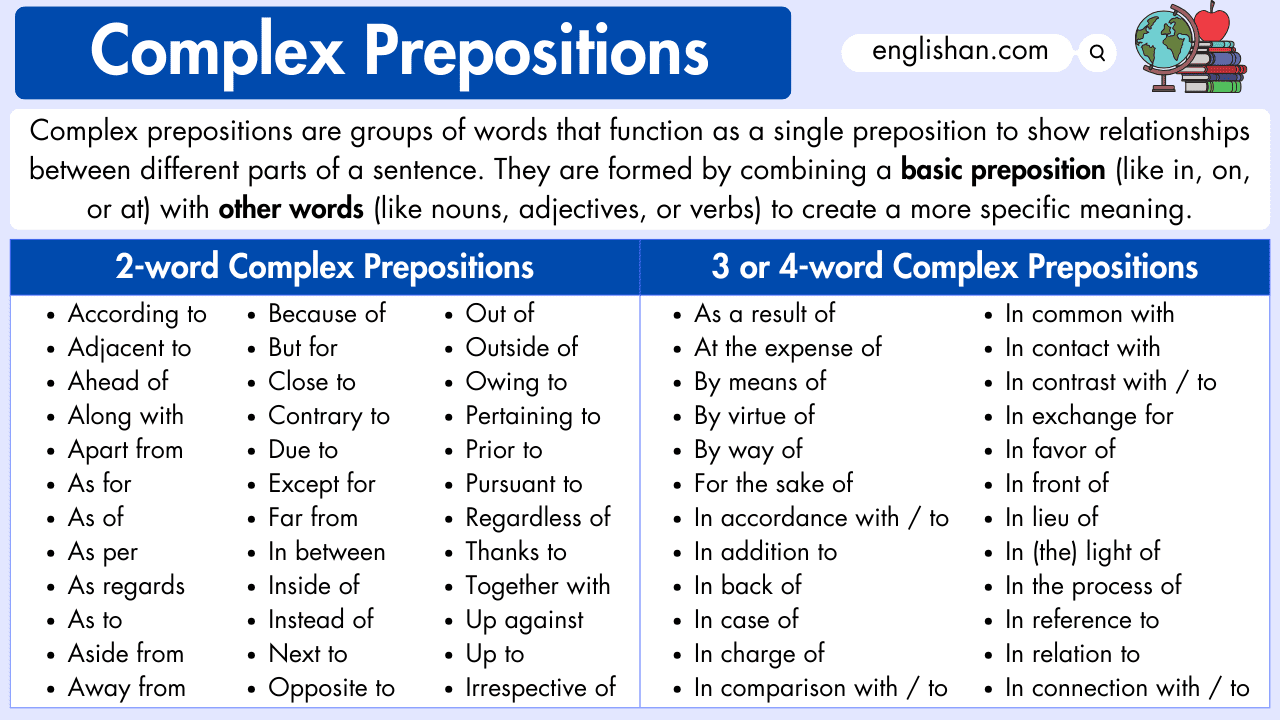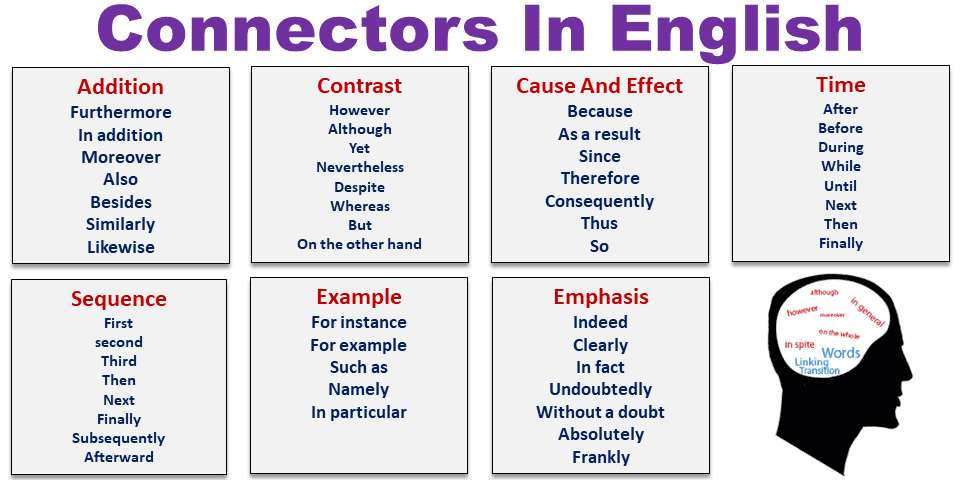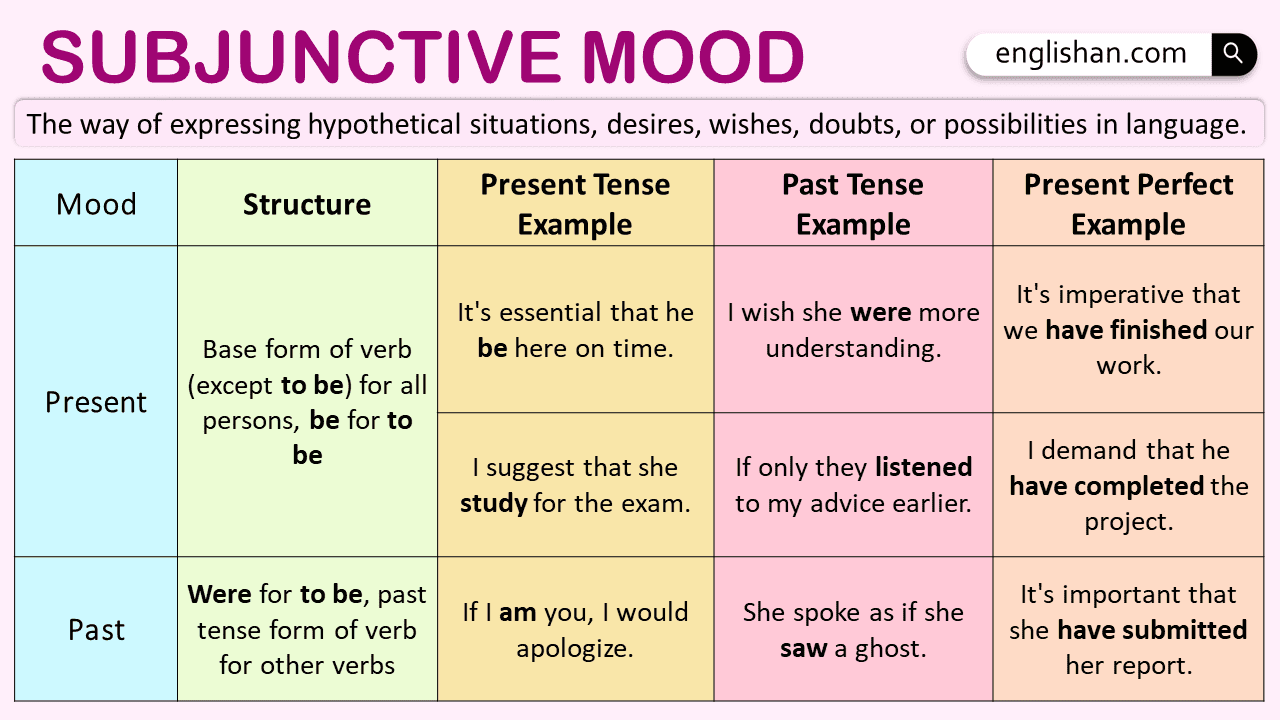Contents
Nouns are words that name people, places, things, and ideas. They can be singular or plural, depending on whether they refer to one or more than one. Singular nouns refer to one person, place, thing, or idea. For example, “book” is a singular noun because it refers to a single item. To make a singular noun plural, you usually add an “s” or “es” to the end of the word. For instance, “book” becomes “books” in the plural form. Some nouns change their form in different ways to become plural. In this article, we’ll explore the world of singular and plural nouns in detail, providing more examples and exercises to help you understand this important grammatical concept. So let’s get started!
What is a singular noun?
A singular noun is a word that names one person, place, thing, or idea. It refers to a single item rather than multiple items. In simple terms, when you talk about just one item or individual, you use a singular noun. For example, “dog” is a singular noun because it represents a single dog, not multiple dogs. Similarly, “book” is a singular noun referring to one book, not several books.
Example:
- cat
- book
- pen
- dog
- idea
- tree
What is a plural noun?
A plural noun is a word used to refer to more than one person, place, thing, or idea. It’s the form of a noun that denotes multiple instances of the entity it represents. In simpler terms, when you’re talking about more than one of something, you use a plural noun. To make most nouns plural, you often add “s” to the singular form.
For example, “cat” becomes “cats,” and “dog” becomes “dogs.” However, some nouns have irregular plural forms, like “child” becoming “children” or “man” becoming “men.” Understanding plural nouns is essential for effective communication. When expressing ideas or observations involving quantities greater than one, using the correct plural form helps to convey your message clearly.
Examples:
- dog → dogscat → catsbook → books
- man → men
- woman → women
- city → cities
Rules:
Forming plural nouns in English generally follows specific rules, though there are some exceptions. Here are the primary rules for creating plural nouns:
Basic Rule (Add “s”): Most nouns simply add “s” to form the plural.
- Example: Cat → Cats, Dog → Dogs, Book → Books
Nouns Ending in -s, -x, -z, -sh, or -ch: Nouns ending in these sounds often take “es” to form the plural.
- Example: Box → Boxes, Bus → Buses, Watch → Watches
Nouns Ending in -y: If a noun ends in -y with a consonant before it, change the “y” to “i” and add “es.”
- Example: Baby → Babies, City → Cities, Lady → Ladies
If a noun ends in -y with a vowel before it, simply add “s.”
- Example: Boy → Boys, Toy → Toys, Day → Days
Nouns Ending in –o: Nouns ending in -o with a vowel before it typically adds “s.”
- Example: Studio → Studios, Zoo → Zoos, Video → Videos
Nouns ending in -o with a consonant before it often takes “es.”
- Example: Potato → Potatoes, Hero → Heroes, Echo → Echoes
Irregular Plurals: Some nouns have irregular forms and don’t follow the standard (above-mentioned) rules.
- Example: Man → Men, Woman → Women, Child → Children
Collective Nouns: Some nouns, like “family” or “team,” may refer to a group but are treated as singular.
- Example: The family is going on a trip.
Mass Nouns: Refers to a substance, material, or concept and usually doesn’t have a plural form.
- Example: water, air, happiness
No Change Plurals: Some nouns have the same form in both singular and plural.
- Example: Deer, Sheep, Fish
Remember that while these rules cover many cases, there are exceptions and irregularities in the English language.
Exceptional cases:
In English, while there are general rules for forming singular and plural nouns, there are also some exceptions and irregularities that don’t follow these rules. Here are some exceptional cases:
Irregular Plurals: Some nouns have irregular plural forms that do not follow the standard rules.
For example:
- Man → Men
- Woman → Women
- Child → Children
- Tooth → Teeth
- Goose → Geese
No Change Plurals: Certain nouns have the same form in both singular and plural. Examples include:
- Deer (one deer, two deer)
- Sheep (one sheep, two sheep)
- Fish (one fish, two fish or more commonly, one fish, two fishes)
Foreign Borrowings: Some words borrowed from other languages maintain their original plural forms. For instance:
- Curriculum → Curricula
- Datum → Data
- Medium → Media
Words Ending in -s: Some words ending in -s do not change in the plural form. For example:
- Series (one series, two series)
- Species (one species, two species)
Collective Nouns: Collective nouns, which represent a group, may take either a singular or plural verb form depending on the context. For example:
- The team is playing well. (Singular)
- The team are all wearing new uniforms. (Plural)
These exceptions highlight the richness and complexity of the English language, reminding us that language often evolves in unique ways over time. While rules provide a general guide, exposure to various words and contexts will deepen your understanding of these exceptional cases.
Types of Singular & Plural Nouns:
In English, singular and plural nouns can be categorized into various types based on their form and usage. Here are some common types:
Types of Singular Nouns:
- Basic Singular Nouns: These are standard nouns representing one person, place, thing, or idea.
- Example: Cat, Book, House
- Proper Nouns: Names of specific individuals, places, or things.
- Example: John, Paris, Mount Everest
- Mass or Uncountable Nouns: Nouns that represent a substance, concept, or idea that is not easily quantified.
- Example: Water, Happiness, Knowledge
- Gerunds: Verbs ending in -ing that function as nouns.
- Example: Swimming, Reading, Writing
Types of Plural Nouns:
- Regular Plural Nouns: Nouns that follow the standard rules and add “s” or “es” to form the plural.
- Example: Dogs, Books, Houses
- Irregular Plural Nouns: Nouns that do not follow the standard rules and have unique plural forms.
- Example: Men (singular: Man), Children (singular: Child)
- Collective Nouns: Nouns that represent a group of people or things.
- Example: Team, Family, Committee
- Compound Nouns: Nouns formed by combining two or more words.
- Example: Toothbrush, Classroom, Swimming pool.
List of Singular Noun
- Cat
- Dog
- Book
- Chair
- Table
- Car
- Friend
- Tree
- Flower
- River
- Mountain
- Sun
- Moon
- Star
- Computer
- Phone
- House
- City
- Country
- Child
- Adult
- Student
- Teacher
- Doctor
- Elephant
- Lion
- Tiger
- Giraffe
- Butterfly
- Fish
- Bird
- Plane
- Boat
- Train
- Bike
- Piano
- Guitar
- Ball
- Hat
- Shirt
- Pants
- Shoe
- Ocean
- Beach
- Sunflower
- Cloud
- Rainbow
- Butterfly
- Bee
- Elephant
List of Plural Noun
- Cats
- Dogs
- Houses
- Cars
- Books
- Friends
- Computers
- Teachers
- Students
- Rivers
- Oceans
- Mountains
- Cities
- Countries
- Families
- Toys
- Birds
- Fish
- Cakes
- Shoes
- Chairs
- Tables
- Plates
- Keys
- Windows
- Doors
- Gardens
- Flowers
- Trees
- Stars
- Planets
- Languages
- Jobs
- Dreams
- Balloons
- Clouds
- Pencils
- Pens
- Elephants
- Tigers
- Zebras
- Horses
- Cows
- Sheep
- Goats
- Chickens
- Ducks
- Puppies
- Kittens
- Children
- Women
- Men
- People
- Doctors
- Artists
Singular Noun vs Plural Noun
| Aspect | Singular Noun | Plural Noun |
|---|---|---|
| Definition | Refers to one person, thing, or idea. | Refers to more than one person, thing, or idea. |
| Formation | simplest form | Formation varies; may involve adding “es,” changing vowels or using irregular forms (e.g., child → children). |
| Examples | Cat, book, friend | Cats, books, friends |
| Subject-Verb Agreement | Requires a singular verb. | Requires a plural verb. |
| Use in Sentences | “The dog is friendly.” | “The dogs are friendly.” |
| Quantity | Represents a single entity. | Represents multiple entities. |
| Common Indicators | “A,” “an,” “this,” “that.” | “Some,” “many,” “these,” “those.” |
Common mistakes to avoid:
Here are some common mistakes with singular and plural nouns that can lead to confusion in writing:
- Incorrect Pluralization:
- Mistake: Adding “s” to irregular nouns (e.g., childs, tooths).
- Correction: Use the correct irregular plural form (e.g., children, teeth).
- Missing “s” in Plural Nouns:
- Mistake: Forgetting to add “s” to form the plural (e.g., cat vs. cats).
- Correction: Ensure the plural form includes the appropriate “s” ending.
- Incorrect Irregular Plurals:
- Mistake: Using the wrong irregular plural form (e.g., mouses instead of mice).
- Correction: Learn and use the correct irregular plural forms (e.g., mice).
- Mismatched Verb Agreement:
- Mistake: Using the wrong verb form with plural nouns (e.g., The team are vs. The team is).
- Correction: Ensure verb agreement matches the number of the noun (e.g., The team is).
- Confusing Collective Nouns:
- Mistake: Treating collective nouns as plural when they are singular (e.g., The team are).
- Correction: Use a singular verb with collective nouns (e.g., The team is).
- Countable and Uncountable Nouns:
- Mistake: Treating uncountable nouns as countable (e.g., furnitures).
- Correction: Use uncountable nouns correctly; avoid adding “s” for pluralization.
- Subject-Verb Agreement with Phrases:
- Mistake: Misplacing the plural noun in a phrase, leading to incorrect verb agreement (e.g., The box of chocolates were).
- Correction: The verb should agree with the main noun in the sentence (e.g., The box of chocolates was).
- Ignoring Context:
- Mistake: Ignoring context and using the wrong form based on singular/plural usage (e.g., The data is/are).
- Correction: Consider the context and choose the appropriate form based on the intended meaning.
Singular and Plural Noun Exercises
Here are some multiple-choice questions (MCQs) to test your understanding of singular and plural nouns.
1. What is the plural form of “child”?
a) Childs
b) Children
c) Children
d) Childes
2. Which of the following is an irregular plural noun?
a) Cats
b) Houses
c) Women
d) Books
3. How do you pluralize a noun ending in -o with a consonant before it?
a) Add “s”
b) Add “es”
c) No change
d) Change the “o” to “i”
4. What is the plural form of “man”?
a) Mans
b) Men
c) Manes
d) Mens
5. Which word is a collective noun?
a) Birds
b) Team
c) Fish
d) Trees
Answers:
1. c) Children
2. c) Women
3. b) Add “es”
4. b) Men
5. b) Team
FAQs:
A singular noun refers to a single person, place, thing, or idea. It is the basic form of a noun before any changes to indicate quantity.
A plural noun refers to more than one person, place, thing, or idea. Pluralization often involves adding “s” or “es” to the singular form, but irregular plurals exist.
For most nouns, you can form the plural by adding “s” to the singular form. For example, “book” becomes “books,” and “dog” becomes “dogs.”
Yes, some nouns have irregular plural forms. For example, “child” becomes “children,” and “man” becomes “men.” Learning these irregular forms is important for correct usage.
Collective nouns refer to groups of people, animals, or things. Examples include “team,” “family,” and “herd.” They can be singular or plural, depending on whether the emphasis is on the group as a whole or its individual members.
Collective nouns can take singular or plural verbs, depending on the intended meaning. If the emphasis is on the group as a single entity, use a singular verb (e.g., “The team is winning”). If the emphasis is on individual members, use a plural verb (e.g., “The team are celebrating their victories”).
You May Also Like
You May Also Like
